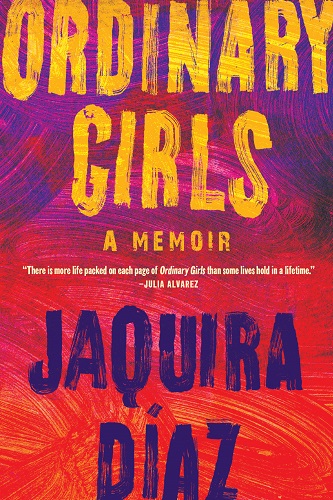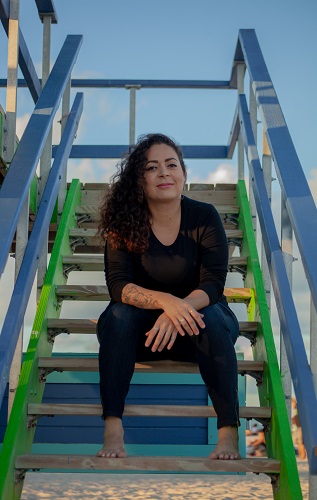- Categories:
An Indies Introduce Q&A With Jaquira Díaz [4]
Jaquira Díaz is the author of Ordinary Girls, a Summer/Fall 2019 Indies Introduce [5] adult debut and a November 2019 Indie Next List [6]pick.
 Díaz was born in Puerto Rico, and spent her childhood there before moving to Miami as a teenager. She has earned two Pushcart Prizes, two MacDowell Colony Fellowships, and an Elizabeth George Foundation Grant, among other awards. Her writing has appeared in The Best American Essays 2016, Rolling Stone, The Guardian, and more. She is a visiting assistant professor at the University of Wisconsin-Madison’s MFA program in creative writing and a consulting editor at the Kenyon Review.
Díaz was born in Puerto Rico, and spent her childhood there before moving to Miami as a teenager. She has earned two Pushcart Prizes, two MacDowell Colony Fellowships, and an Elizabeth George Foundation Grant, among other awards. Her writing has appeared in The Best American Essays 2016, Rolling Stone, The Guardian, and more. She is a visiting assistant professor at the University of Wisconsin-Madison’s MFA program in creative writing and a consulting editor at the Kenyon Review.
Indies Introduce panelist Elissa Sweet of Bank Square Books [7] in Mystic, Connecticut, called Díaz’s debut “a master class in the art of the memoir.”
Said Sweet, “Ordinary Girls is the rare type of memoir that stuck with me long after I stopped reading; phrases and moments kept coming back to me at random times throughout my day. Created by an author at the top of her craft, it’s gorgeous and heartbreaking, hopeful and devastating. Jaquira Díaz’s fascinating story takes us from her childhood in the projects of Puerto Rico, where we witness her mother’s worsening schizophrenia and drug addiction, to Díaz’s teenage years in Miami, filled with fights, runaway attempts, sexual assault, drug use, and stints in jail, but also moments of love and brilliance — and, finally, to adulthood, where Díaz wrestles with the demons that chased her all her life and begins to learn what she really wants. If you’re looking for a memoir dealing with queer identity, addiction, family struggles, abuse, poverty, Puerto Rican history, friendship, or the power of the written word — or if you just want a lyrical and heartbreaking story that will keep you enthralled from the first sentence — seek no further.”
Here, Sweet and Díaz discuss the 12 years it took the author to write her book, through traumatic life events, mental illness, and difficult relationships.
Elissa Sweet: It seems you’ve always been a writer — you wrote short stories as a child, essays as a teenager, and kept a journal throughout your life. At what point did you realize that it was time to write a memoir? Jaquira Díaz:

ES: In Ordinary Girls, you write beautifully and candidly about some very painful moments in your life, from sexual assault and abuse to suicide attempts and drug use. As you were writing the book, you had to revisit many of those painful memories in detail. What was that like for you?
JD: To say that the writing of this book drained me, wrecked me, would be an understatement: I gained weight, I lost weight, my hair started falling out, I had the worst insomnia I’ve had in my life. During those 12 years, I lost relationships, friendships, and then my grandmother died by suicide. I often needed time away from the book in order to take care of myself, and to make sense of what I was doing, to interrogate different parts of the book, to examine my life as I was living it. Writing this book is the hardest thing I’ve ever done.
ES: Your mother was an incredibly complicated woman — tormented by addiction and mental illness and often abusive toward you — and yet you write about her with empathy and kindness. How were you able to get to that point?
JD: When I first started writing Ordinary Girls, I wrote around her, avoiding the truth. The hardest thing about writing about my mother was seeing her clearly. It took a long time to get some place where I could write about her. Early in the writing process, a friend who read some chapters said, “Where’s your mother? Why isn’t your mother in these pages?” I’d written about years of my life without even mentioning her. It was very painful to look at her and think about the person she really was before and after her illness. I had to set aside shame at my past and my anger at my mother. I was only able to write about her after forgiving her.
ES: You are open about your struggles with depression and suicide throughout Ordinary Girls. What has helped you most as you cope with mental illness?
JD: I recommend professional help if you’re trying to cope with mental illness. What’s working for me won’t necessarily help other people, and it won’t necessarily be accessible to all: a combination of therapy, self-care, exercise, medical treatment, changing my diet, religious practice, falling in love, traveling, asking for help, and a number of other things.
Every day is a struggle. Every day is a blessing. Most importantly, seeking help, knowing that you’re not alone, that there are people who can help. There is no shame in asking for help.
ES: At several points in the book, you decry the fact that you did not see kids who looked like you in books, television, and movies when you were growing up. While media has made a lot of strides in diverse representation — and your book is another step in that direction — what changes do you still wish to see?
JD: We still have a long way to go. Specific changes I’d like to see? I’d love to be able to have choices. I’d love more than a single show on Netflix about a Latinx family, a selection of shows depicting black Latinxs, a selection of TV shows that are accurate portrayals of queer black Puerto Ricans, with a cast of Afro-Latinxs, with a diverse writers’ room, with actors and writers and directors who are queer and trans and genderqueer and black and Latinx and bilingual. I want more than simple “representation.” I want black people and Latinx people and QTPOC to have choices.
Ordinary Girls by Jaquira Díaz (Algonquin Books, 9781616209131, Hardcover Memoir, $26.95) On Sale Date: 10/29/2019.
Find out more about the author at jaquiradiaz.com [9].
ABA member stores are invited to use this interview or any others in our series of Q&As with Indies Introduce debut authors [3] in newsletters and social media and in online and in-store promotions. Please let us know if you do [10].